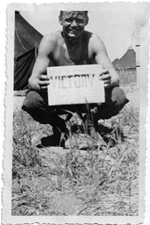Brightwood Boys, The History of the Men from
the North End of
Springfield, Massachusetts,
During World War II
by Christopher P. Montagna
CHAPTER 36
V-E DAY
Twelve days after Adam was discharged from service, on May 8, 1945, the 277th Engineer Combat Battalion while stationed at Kluntz, Germany received the following communiqué:
"German command surrendered at 1800 8 May 45. Hostilities ceased on all Second Br. Army Fronts at 050800 8 May 45"
Army Fronts at 050800 8 May 45"
Cognac and champagne were passed around as the men of the 277th celebrated the German surrender. Across the English Channel, Pfc. Dick Messenger was celebrating the Allied victory atop a statue outside Buckingham Palace.
Back in Springfield, the headline in the Daily News read:
"V-E DAY PROCLAIMED"
"Solemn Silence Marks V-E Day as City Plans to Curb Celebration are Discarded"
"Nazi War Ends at 6.01 Tonight, Churchill Says"
However, the war was far from over. As President Truman proclaimed Sunday May 13, 1945 as a National Day of Prayer and Thanksgiving, he offered the "solemn but glorious hour of Victory finds us with the job but half done". The Nation continued to work for total victory over the enemy in the Pacific.
In the Pacific, United State Army units under the direction of General Douglas MacArthur's had been fighting the New Guinea Campaign. On March 11, 1942 Lt. Gen. Douglas MacArthur departed the Philippine Islands with the famous vow, "I shall return." Fulfillment of that vow was dependent upon the dedication and sacrifice of the men of the United States Army. Among those committed soldiers was Phillip Girard who lived at 55 Portland Street.
Phillip Girard was one of thirteen children born to Rosaire and Molly Girard. His father served on the draft board in Springfield and would make the sacrifice of sending four of his sons to fight in the war. Prior to the war, Phillip Girard and his brothers had one of the largest distribution routes for the Springfield newspaper. Once his days as a paperboy passed, Phillip delivered groceries on his bicycle and then worked as a truck driver. Phillip was inducted along with his brother Raymond on March 8, 1943 and was assigned to the 103rd Infantry Regiment, Company M, 43rd Infantry Division.
Joining Phillip in the fight were his brothers: James Girard, the eldest enlisted in the Army Air Corp on November 5, 1942. He was stationed at Sumter, South Carolina guarding air planes destined for the European Theater of Operations. Raymond Girard served as an army interpreter in Paris, France. Robert Girard served with the 82nd Airborne Division in Europe.
In December of 1943, Phillip Girard departed the State's and joined General Leonard Wing’s 43rd Division, often referred to as "Wing's Victory" when describing their combat actions, in New Zealand. Vigorous and intensive training took place for several months. In July 1944 the 43rd Division took part in the Japanese forces from New Guinea. Landing at Aitape, Phillip Girard and the men of the 43rd prevented the Japanese from reinforcing their troops along the Drinimour River. This successful campaign evolved into preparation for the invasion of the Philippine Islands.
On January 9, 1945, twenty-one-year old Phillip Girard participated in the amphibious landing at Lingayen Gulf, Luzon and engaged enemy forces as the 103rd fought into the Lingayen Plain. The Philippine offensive continued against the Japanese through February 1945. After four months of fighting, the long campaign was coming to a climax in May of 1945.
On My 6, 1945, Phillip Girard and the men of the 43rd Division were preparing to assault the Ipo Dam, which was a major water supply for the city of Manila. The Allied forces were trying to prevent the retreating Japanese forces from blowing-up the dam. The Ipo Dam was defended by 30,000 Japanese soldiers and fortified by elaborate caves, dug in gun positions, and an extensive network of trenches. The initial assault by U.S. forces caught the defending Japanese by surprise. Within a few days Philip Girard and the men of the 43rd Division contacted the Japanese main line where the enemy defenses stiffened and the American suffered heavy casualties.
After fourteen days of intense fighting, the Ipo dam was secured and the Japanese were prevented from igniting the explosive charges placed around the dam. Phillip Girard’s actions during the fight to secure the Philippines would result in his being awarded a purple heart and bronze star for heroism.